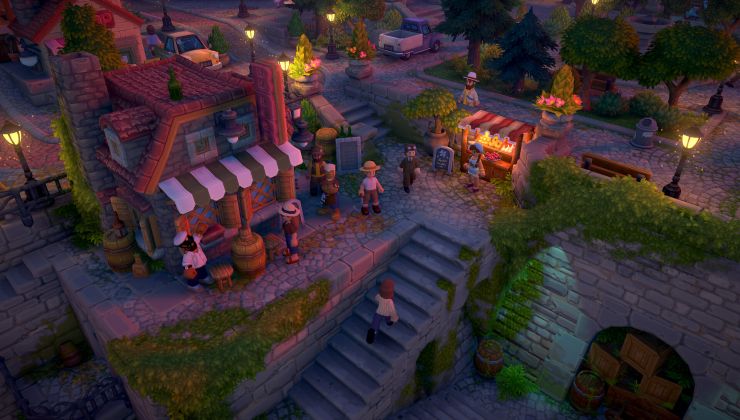GamesIndustry.biz recently spoke to Ubisoft, and something said during the interview seems to have created some sparks across the industry about game ownership.
What was said is not all that surprising really. Ubisoft, like multiple others, run subscription services with theirs being Ubisoft+ that just had a bit of a change into multiple tiers. These services are everywhere now like Xbox Game Pass, EA Play and others. That, and GI.biz spoke to Philippe Tremblay, director of subscriptions at Ubisoft so obviously they're going to be somewhat biased on what they think — it's their job.
From the interview, the bit in question:
One of the things we saw is that gamers are used to, a little bit like DVD, having and owning their games. That's the consumer shift that needs to happen. They got comfortable not owning their CD collection or DVD collection. That's a transformation that's been a bit slower to happen [in games]. As gamers grow comfortable in that aspect… you don't lose your progress. If you resume your game at another time, your progress file is still there. That's not been deleted. You don't lose what you've built in the game or your engagement with the game. So it's about feeling comfortable with not owning your game.
The GOG team certainly took notice, mentioning on X (formerly Twitter): "You should feel extremely comfortable with owning your games on GOG (they're DRM-free) :)".
It's worth noting that clearly it's going well for Ubisoft, as Tremblay mentioned October 2023 was their biggest month in Ubisoft+ history. So people are clearly buying into game subscriptions more and more. And related, Microsoft said back in 2022 that Xbox Game Pass had 25 million subscribers. Subscriptions are clearly here to stay.
Also worth noting, to be clear, Ubisoft don't plan to force you into one way or another noting:
"The point is not to force users to go down one route or another," he explains. "We offer purchase, we offer subscription, and it's the gamer's preference that is important here. We are seeing some people who buy choosing to subscribe now, but it all works."
Given how services can just entirely remove your paid-for content, this whole issue of ownership is a concerning one. Like how Sony were going to just remove previously purchased Discovery content from users, although they've since backtracked on that after public outcry.
The thing is, you have to remember, you don't actually own your games on Steam either. This has been well-known for a long time now. As per Steam's Subscriber Agreement under the "A. General Content and Services License" section:
[…] The Content and Services are licensed, not sold. Your license confers no title or ownership in the Content and Services. To make use of the Content and Services, you must have a Steam Account and you may be required to be running the Steam client and maintaining a connection to the Internet.
I'll admit, it's not entirely the same. Valve won't take away your games if you don't pay them every month, it's not a subscription in the same way, and plenty of games on Steam are actually entirely DRM-free and can be run outside of Steam. But still, it's something to remember, ownership has been on the decline for a long time.
A lot of it simply comes down to convenience though right? Plenty of us pay for Netflix, Disney+, Amazon Prime and so on and so on — so we can just quickly jump into a show or a movie they have available. But then the problem there is, again, everyone wants their own service. There's more popping up all the time, and rights on various shows end up split between them and you end up paying more and more (look at the mess of Pokémon streaming) and never owning a damn thing.
Over to you in the comments: what are your thoughts?
Quoting: elmapulQuoting: finaldestThe only exception being PC gaming as its simply impossible to buy games physically so I am sticking with Steam and maybe GOG in future if they ever give linux 1st class support.gog is actually better than physical, you can have as many backups as you want, good luck riping your games that you have on physical media for other platforms, few people have the know how / tools to do that.
I will admit, it's not always strait forward to rip the physical media of non-PC discs, however, for most, it's not really rocket science either, and if a person is already at the point where they feel ripping their media is the way to go, they would probably have the where-with-all, if not the direct technical know-how, to figure the process out quickly enough. It's not the difficulty of ripping as the reason few do it, it's giving a shiz enough.
For those physical discs that have a higher than average ripping difficulty (looking at you, OG XBox discs), finding a rip online isn't horribly difficult either.
Quoting: ObsidianBlkFor those physical discs that have a higher than average ripping difficulty (looking at you, OG XBox discs), finding a rip online isn't horribly difficult either.Crack kills... but it also preserves old software. :P
Quoting: EikeThen couldn't it just display the ads and then paint over them with the background colour? I don't care if they're there, I just care if I see them.Quoting: Purple Library GuyQuoting: ssj17vegetaGoogle taking bolder and bolder steps against ad blockingGoing slightly off topic . . . So, can someone answer me this question:
Why can't there be ad blocking that the websites can't even tell is happening?
I mean, like, normal well-behaved ad blocking as far as I can tell tries to justify its existence in terms of reducing bandwidth, by stopping the ads from being downloaded in the first place. And so, the websites can tell you're using them because they're telling the websites not to send the ads, I guess. And so in turn, browsers are willing to feature them in their easy-to-look-up add-on libraries, I guess, because they're playing nice and letting the websites give you a hard time for using them. But this makes them not so useful, right?
But I don't really care about the bandwidth. Couldn't an ad blocker just let the ads get downloaded but just make it so they aren't shown to you? Then the website wouldn't be able to tell the difference and you could have an ad blocker that worked. Is that not possible?
I fear yes, it might be impossible. Web went from mostly HTML to mostly JavaScript. Without it, many websites just don't work. But with Javascript, the website can check if the relevant (for the website owner) parts are displayed or not. Of course, the blocker could lie to the code, but it wouldn't know when it had to lie and when it had to say the truth to keep the page working.
I don't do streaming. Games are the only thing where I've almost entirely made the switch to digital, and that's because I switched from console to PC.
Quoting: Purple Library GuyThen couldn't it just display the ads and then paint over them with the background colour? I don't care if they're there, I just care if I see them.
That sounds possible. Adding something is a thing the blocker could (always) lie about to the web site code.
Quoting: Purple Library GuyQuoting: ssj17vegetaGoogle taking bolder and bolder steps against ad blockingGoing slightly off topic . . . So, can someone answer me this question:
Why can't there be ad blocking that the websites can't even tell is happening?
It's essentially a game of cat and mouse. A website cannot know exactly what happens on your computer, but it can guess some of it. Let's assume you want to watch a video and there is a video advert that should play before it.
- Your ad blocker simply drops the request to the advert, your video plays.
- Now the provider decides to check whether the advert video has been requested and block main video otherwise.
- Ad blocker now send a request but close the connection immediately, faking the advert view.
- Provider adds a check to ensure 100% of the advert was downloaded.
- Ad blocker now downloads the whole advert and drops it.
- Provider adds a mechanism to delay the play button by the duration of the advert video.
- Ad blocker now signals to the player the advert is done playing even though it hasn't played, restoring the button.
- ... and so on
In short, the answer is that it's not possible because you could always invent a new way to circumvent or detect whatever the ad blocker does to block the ads. The good news is that in the opposite is true and ad blockers are free to evolve in order to bypass the new checks.
Back on topic, I personally do not mind subscription models or not owning my games. I've never replayed an old game and as such they do not really have value to me. The same would be true for movies or books, I have no issue reading a book from the library and never seeing it again or ever owning it.
That said, I do not use any subscription service because I have yet to find one that is not just a thinly veiled attempt to extract more money. Unless you count steam, which I use because it offers good value to me. Also, access the the entire steam catalogue for a reasonable amount per month would definitely be something I'd sign up for.
Another consideration is that I care about video games as part of the human culture and history, I would like to see them archived and available long after their original publisher is gone. So any subscription service which aims to block this would be an immediate no (such as purely streaming-based services).
Quoting: hell0I see your point, although it seems to me that the advertiser has far fewer points of leverage the moment it's not about video.Quoting: Purple Library GuyQuoting: ssj17vegetaGoogle taking bolder and bolder steps against ad blockingGoing slightly off topic . . . So, can someone answer me this question:
Why can't there be ad blocking that the websites can't even tell is happening?
It's essentially a game of cat and mouse. A website cannot know exactly what happens on your computer, but it can guess some of it. Let's assume you want to watch a video and there is a video advert that should play before it.
- Your ad blocker simply drops the request to the advert, your video plays.
- Now the provider decides to check whether the advert video has been requested and block main video otherwise.
- Ad blocker now send a request but close the connection immediately, faking the advert view.
- Provider adds a check to ensure 100% of the advert was downloaded.
- Ad blocker now downloads the whole advert and drops it.
- Provider adds a mechanism to delay the play button by the duration of the advert video.
- Ad blocker now signals to the player the advert is done playing even though it hasn't played, restoring the button.
- ... and so on
In short, the answer is that it's not possible because you could always invent a new way to circumvent or detect whatever the ad blocker does to block the ads. The good news is that in the opposite is true and ad blockers are free to evolve in order to bypass the new checks.
Back on topic, I personally do not mind subscription models or not owning my games. I've never replayed an old game and as such they do not really have value to me. The same would be true for movies or books, I have no issue reading a book from the library and never seeing it again or ever owning it.
That said, I do not use any subscription service because I have yet to find one that is not just a thinly veiled attempt to extract more money. Unless you count steam, which I use because it offers good value to me. Also, access the the entire steam catalogue for a reasonable amount per month would definitely be something I'd sign up for.
Another consideration is that I care about video games as part of the human culture and history, I would like to see them archived and available long after their original publisher is gone. So any subscription service which aims to block this would be an immediate no (such as purely streaming-based services).
Unpopular take: I've made my peace with it. Also if I never play another corporate video game again I will live a full life. If I never see a new movie or tv show I will be happy. For example, Star Wars ended with RoTJ in the 1980's no matter what they pretend continued it. The MCU ended with Endgame. CoD ended with Modern Warfare fifteen years ago.
You get the idea. It's time to walk away. It's time to divorce yourself from their content. It's time to start taking up different ways to use your time. I suggest 3D printing or other forays into DIY CNC, but that's my proclivity. You do you. But trying to beat corporate playing by corporate's rules in corporate's system is just beating your head against a brick wall.
I am running a small business using only Linux computers and software that runs natively on Linux. Lightburn is not an open source program, but it runs on Linux natively so I am happy to pay for a license to use it, for the same reason that I am a supporter of Steam despite the fact that it's a combination DRM program AND a data mining operation. If they are going to support our platform natively I will support them and be happy to do it.
At bare minimum I would suggest never paying to play another Ubisoft game again. Hell, they don't even offer Linux native versions of their software. So they want us to be comfortable not owning anything, okay then they have to get comfortable with us never paying them for anything. I've played all the Far Cry I need to play so goodbye Ubisoft and any other corporation that takes that stance. You won't be missed.










See more from me